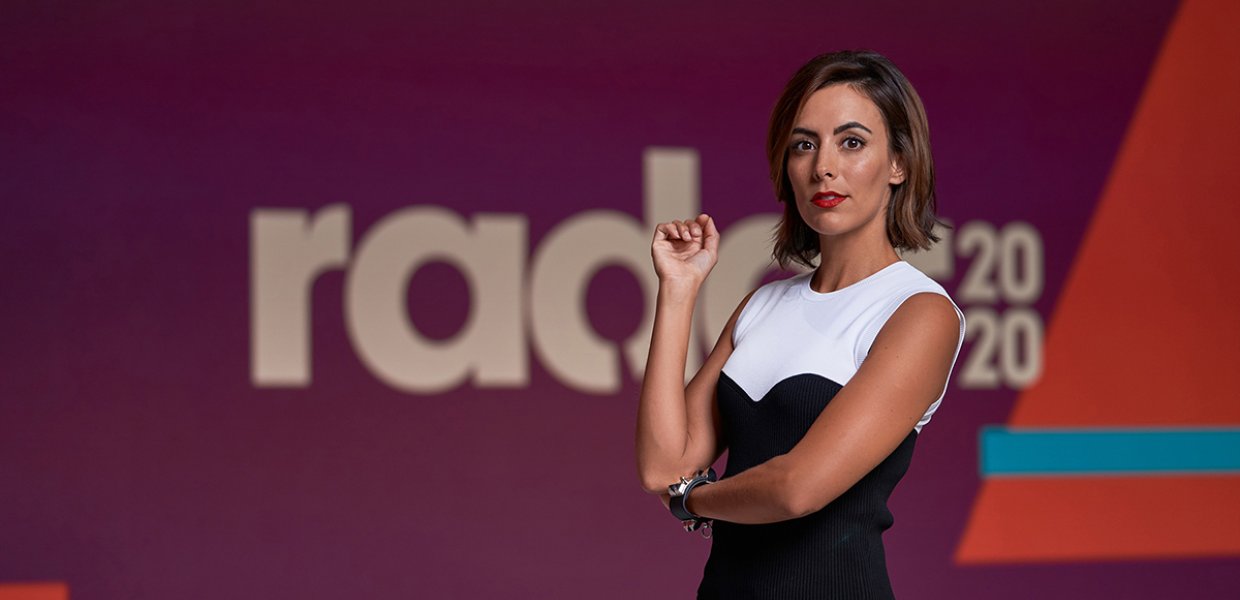As host and lead writer of Telemundo’s only English-language news show, Gabriela Fresquez aims to cover Latinx communities with depth and nuance.
When Gabriela Fresquez watched the news after the 2016 presidential election, she was dismayed by the portrayal of Latinx people. It felt too negative, too narrow. It didn’t celebrate the community that makes her glow with pride.
So, she created her own news show on YouTube called The LatinXpert.
“It was basically a response to the 2016 election of Donald Trump and me becoming exasperated with turning on the news and watching all of these negative images of Latinx people in the news media,” she said.
Those negative images, Fresquez said, narrowly associate Latinx people with issues like immigration and crime while ignoring the rich culture and diversity in Latinx communities.
Fresquez, who earned her degree in public relations from USC Annenberg in 2008, wanted to challenge the mainstream view but in a positive way. She wanted to put out something fun and friendly to highlight what she loves about Latinx culture.
She produced explainers on Venezuela’s political turmoil and videos about everything from financial planning to the history of “La Cucaracha.”
The show didn’t exactly go viral; each episode got a few hundred views. But it did lead to a unique opportunity with Telemundo — one of the country’s biggest Spanish-language media companies.
Network leaders wanted to launch an English-language news show for younger audiences, and they tabbed Fresquez as its host.
USC alumna introduces depth and nuance to Latinx news coverage
The show, Radar 2021, is currently Telemundo’s only English-language news program. It picks up right where LatinXpert left off, striving to cover Latinx communities in more nuanced ways than traditional news outlets.
“The biggest difference is we are not looking at our community like a monolith, and that is what other media outlets constantly get challenged on,” Fresquez said. “We are not covering our communities solely in election years. We are looking at our communities in a much deeper way.”
The show covers varied topics and seeks to appeal to everyone in the broad and diverse Latinx community.
“We’re talking about every single U.S.-based Latinx person,” she said. “You have Gen Z, Gen X, feminist issues, climate change, activism, the LGBTQ community. There are so many different things we can talk about on so many different levels.”
Grace González, the show’s creator and executive producer, came up with the idea for Radar 2021 alongside senior producer Grace Solórzano after Telemundo received a Google Initiative grant. She had a broad directive: Make English-language content for Latinx viewers between ages 18 and 35. In that framework, she could create whatever she wanted, under the guidance of the news division’s leadership.
She used the opportunity to establish an inclusive space that amplified different voices and perspectives. That focus had been missing from the media environment, González said. Studies show that Latinx are underrepresented in media, including news and entertainment.
A 2020 study on inequality in movies by the USC Annenberg Inclusion Initiative found that in 1,300 popular films made between 2007 and 2019, Latinx characters accounted for only 4.9% of all speaking roles. Latinx make up 18% of the U.S. population.
The study also found that only 3.7% of the directors of those movies identify as Latinx.
Regarding the news media, newsrooms are less diverse than the U.S. population. Recent internal diversity studies by Hearst, Vice, Condé Nast and Gannett all show that less than 18% of their workforce is Latinx. This is also the case among new hires.
Gabriela Fresquez’s show gains critical acclaim by paving a new path
Radar 2021 gives González, Fresquez and their colleagues the freedom to cover a wide range of topics through a Latinx lens. For example, during the 2020 election, they avoided stories about polls or politicians.
“Our first topic wasn’t the elections,” González said. “We started our first episode with the Black Lives Matter movement and how racism impacts the Latino community.”
Other episodes focused on climate change and education.
The show is gaining critical acclaim. It earned a nomination for Best Informational Program by the Imagen Foundation, which is dedicated to positive portrayals of Latinx people in the entertainment industry. Other nominees include shows produced by PBS, National Geographic, ABC and Netflix. The show was also nominated in the social justice category of the New York Festivals’ TV & Film Awards.
Fresquez is particularly proud of the fact that Radar 2021 offers the opportunity to discuss issues that sometimes are considered taboo in Latinx communities, such as mental health, the hyper-sexualization of Latinas, the LGBTQ community and machismo culture.
“It may not be things you want to talk about in front of your abuelos or topics you bring up in polite company,” Fresquez said. “It challenges us to really dive into that discomfort.”
And that discomfort is key to processing what is happening in the world, especially amid the political tension of recent years.
“When we start to close off from each other, when we make up our minds about a group of people and are no longer able to listen to them, I think that’s when the real problems begin,” she said. “I think giving people a space to have these conversations about things that are difficult to talk about in society, that’s where the healing begins.”
This story was originally published on USC News.
